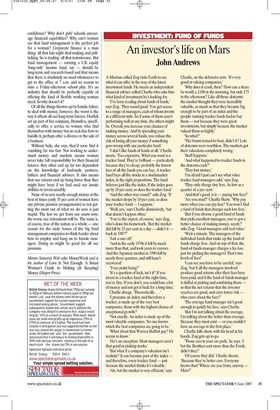An investor's life on Mars
John Andrews A Martian called Zog visits Earth to see what it can offer in the way of the latest investment funds. He meets an independent financial adviser called Charlie who asks him what kind of investment he's looking for.
'I've been reading about funds of funds,' says Zog. 'They sound good. You get access to a range of managers, each of whom invests in a different style. So if some of them aren't performing well at anytime, the others might be. Overall, you increase your chances of making money. And by spreading your money across several funds, you reduce the risk of losing all your money if something goes wrong with one particular fund.'
'I don't like funds of funds at all,' Charlie snorts. 'Too expensive. What you want is a tracker fund. They're brilliant — particularly because they're cheap, probably the lowest fees of all the funds you can buy. A tracker fund buys all the stocks in a stockmarket index, in the right proportions. The fund behaves just like the index. If the index goes up by 10 per cent, so does the tracker fund.'
'And the other way round?' asks Zog. 'If the market drops by 10 per cent, so does your tracker fund — I suppose.'
'Well, yes,' says Charlie dismissively, 'but that doesn't happen often.'
'You're the expert, of course,' says Zog, who's done his homework. 'But the market did fall by 25 per cent in a day — didn't it — back in 1987?'
'Just a one-off.'
'And in the early 1970s it fell by much more than that, and took years to recover. And the Japanese market in 1990 fell by nearly three quarters, and still hasn't recovered.'
'Your point being?'
'It's a question of luck, isn't it? If you invest in a tracker fund at the right time, you're fine. If you don't, you could lose a lot of money and not get it back for a long time.'
Charlie shrugs. 'Theoretically.
'I presume an index, and therefore a tracker, is made up of the very best companies, those with the highest chance of exceptional growth?'
'Not exactly. An index is made up of the most valuable companies. No one knows which the best companies are going to be.'
'What about that Warren Buffett guy? He seems to know.'
'He's an exception. Most managers aren't that good at picking stocks.'
'But what if a company's valuation isn't realistic? It can become part of the index — and therefore, every tracker fund —just because the market thinks it's valuable.'
`Ah, but the market is very efficient,' says Charlie, on the defensive now. 'It's very good at valuing companies.'
'Why does it crash, then? How can a share be worth a £100 in the morning, but only £75 in the afternoon? Like all those dotcoms: the market thought they were incredibly valuable, so much so that they became big enough to be part of an index and the people running tracker funds had to buy them — not because they were great investments, but simply because the market valued them so highly.'
`So what?'
'The boom turned to bust, didn't it? Lots of dotcoms were worthless. The markets got their valuations completely wrong.'
'Stuff happens.'
'And what happened to tracker funds in the dotcom crash?'
'They lost money.'
`I'm afraid I just can't see what value tracker fund managers add,' says Zog.
'They only charge tiny fees. As low as a quarter of a per cent.'
'And that's good, is it — paying low fees?'
'Are you mad?' Charlie blurts. 'Why pay more when you can pay less? You won't find a fund of funds that charges such low fees.'
'But if you choose a good fund of funds that picks excellent managers, you've got a better chance of making money, surely?' asks Zog. 'Good managers add real value.'
'Wait a minute. The managers of the individual funds that make up the fund of funds charge fees. And on top of that, the fund-of-funds manager charges a fee too, just for picking the managers! That's two levels of fees!'
'I can see you have to be careful,' says Zog, 'but if all the managers involved produce good returns after their fees have been paid, and if the fund-of-funds manager is skilful at picking and combining them — so that the net returns that the investor receives are good, and carry lower risk — who cares about the fees?'
'The average fund manager isn't good enough to justify his fees,' says Charlie.
'But I'm not talking about the average, I'm talking about the better-than-average. Because they must exist — or you couldn't have an average in the first place.'
Charlie falls silent, with his head in his hands. Zog gets up to go.
'Those cars in your car park,' he says. 'I bet the Bentleys cost more than the Fords, didn't they?'
'Of course they did,' Charlie shouts. 'Because they're better cars. Everyone knows that! Where are you from, anyway — Mars?'




























































 Previous page
Previous page